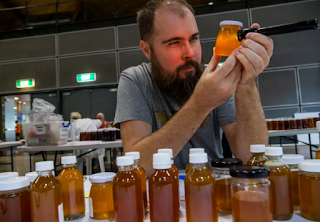The Buzz about Urban Beekeeping: A Growing Trend with Some Stings in the Tale
In recent years, urban beekeeping has seen a remarkable surge in popularity, with thousands of bee enthusiasts taking up this rewarding hobby. However, the reaction from neighbors is not always as sweet as the honey produced by these urban hives.
Rob Simms, a resident of Sydney's lower north shore, exemplifies this trend. Simms, who resides in a ground-floor flat, has set up three beehives in his garden and has resorted to giving away jars of honey to maintain amicable relations with his neighbors. He admitted that he initially hesitated to start beekeeping due to concerns about neighbor approval. However, his sweet gesture of gifting honey jars has fostered a harmonious atmosphere in his community.
Simms is part of a burgeoning community of nearly 14,000 backyard beekeepers in New South Wales (NSW), a number that has almost doubled over the past four years, notably during the COVID-19 lockdowns. He began his journey with two hives four years ago, gaining a third when the bees swarmed. Fortunately, he hasn't faced any complaints about bee stings.
Nonetheless, the surge in urban beekeeping is not without its challenges, particularly for those living in close proximity to these hives. Catherine Heath, a Petersham resident, is an advocate for beekeeping. However, she's recently faced issues with aggressive bees in her garden. She noticed a neighboring house had even put up a sign advertising homegrown honey. The situation has reached a point where her garden has become a no-go zone during good weather due to the alarming behavior of these bees. They have been attacking both dogs and humans unprovoked, causing distress and stings.
Douglas Purdie, president of the Sydney Bee Club and vice-president of Amateur Beekeepers Australia, explains that such aggressive behavior is unusual but not unheard of in bees. He likens it to the variability in the temperament of dogs, emphasizing that bees also undergo behavioral cycles. Sometimes, their aggression can be triggered when honey is harvested or due to a lack of food. In such cases, a solution may involve replacing the queen bee to modify the hive's genetics.
The beekeeping boom has seen a significant increase in registered beekeepers and hives in NSW. According to the NSW Department of Primary Industries, the state now has 15,179 registered beekeepers and 398,263 hives. A notable growth has been observed in the recreational sector, with 85 percent of hives represented by commercial beekeepers. This marks a significant increase from the 8,349 registered beekeepers in November 2019. The growth, however, is mainly attributed to recreational beekeeping.
Despite the initial boom, the beekeeping trend has tapered off with the easing of lockdowns. Additionally, the arrival of the varroa mite has brought considerable challenges to the industry. The Department reports that a significant number of hives were euthanized in a failed attempt to eradicate the pest, mainly in the Hunter Valley, Newcastle, Central Coast, and Kempsey regions.
On a more positive note, there has been a parallel growth in native beekeeping, which does not require registration. Dr. Tobias Smith, a researcher at the University of Queensland, highlights the advantages of keeping native bees. Native bees are stingless and not susceptible to the varroa mite or most bee pests. Although they produce significantly less honey compared to European honeybees, the native honey is described as "tangy and delicious" and may have potential health benefits. Dr. Smith notes that native bees are excellent for biodiversity as they don't compete with native pollinators. Keeping them is hassle-free, allowing one to appreciate their activities and enjoy the benefits without the need for extensive management.
In conclusion, urban beekeeping continues to capture the interest of a diverse group of enthusiasts, but it is essential to be aware of the potential challenges it may pose, especially in densely populated areas. As this fascinating hobby grows, understanding bee behavior and adopting responsible practices becomes crucial for maintaining harmony with both the bees and the community.
#UrbanBeekeeping, #BeekeepingTrends, #BeeBehavior, #HoneyHobby, #BeekeeperCommunity, #NativeBees, #VarroaMiteChallenge, #EnvironmentalActivities, #BackyardBeekeeping, #Biodiversity

